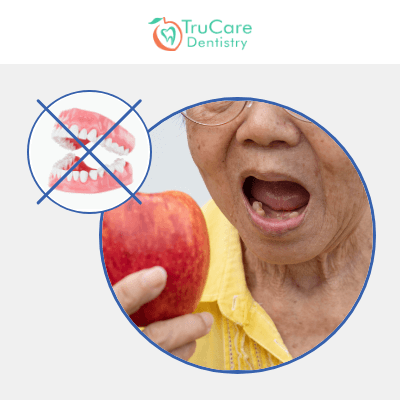
It may be injured, age, or any other reason for teeth loss. And, you are not willing to have implants or dentures; you are harming your oral health.
Sometimes, it’s been seen that people eat without the denture. They become good at eating without teeth or dentures. But, do you know that you are inviting oral health issues while chewing without dentures?
Gum and jaw problems
When you chew without teeth or dentures, your gums and jaws need to work harder to chew the food you are consuming. Often, you can harm the gum line while chewing the hard food. The pressure on gum and jaw can be damaged and become sore and irritated over time.
Else, you can opt for the soft and semi-solid diet by compromising your desire to eat all you want. Most of the time, it is not the case. People are reluctant to have soft food without teeth. They want to, and they should be, but with the implant or dentures only.
The jawbone constantly gets in flux and changes in response to force placed on it from teeth or dentures. Without this pressure, the bone becomes impaired over time and becomes prone to fractures.
So, if you are eating without a denture, you are causing severe harm to your oral health.
Gastrointestinal problems
When you chew your food without teeth (implant or denture), the food is not properly chewed. No matter how hard or long you chew a morsel, it can’t be replaced by the teeth. Hence, it will create many gastrointestinal problems.
When food is not well-chewed, and the food particles are too big to be broken down, incomplete digestion takes place. Undigested food generally extracts nutrients, and food becomes hay for bacteria in the colon. This will lead to bacterial growth, flatulence, and other symptoms of indigestion, causing discomfort or making you sick.
Moreover, chewing without a denture will not produce an ample amount of saliva, which aids digestion. Saliva from the chewing process helps the food to pass into the small intestine and via the digestive tract.
Bone loss
When you persistently eat without teeth or dentures, or implants for a long time, bone loss may occur. Using your gums to bite and grind may start fading off the corresponding bone ridges of the jawline.
Every time you chew without teeth, the ridge undergoes some pressure that will cause the jawbone to recede, and it may result in permanent bone loss. And, in such cases, restorative dental treatment becomes more complex.
So, what should you do?
Well, you should consult your dentist and schedule treatment to have implants or dentures ASAP. Eating without dentures is not recommended, which will surely create an adverse effect on your dental health.
If you are looking for dental implant treatment in Roswell, GA, TruCare dentistry is there for you.
Your dentist will guide you through what type of implants or dentures you need and after-care of those. The dentures are an artificial replacement for your natural teeth. It is usually made of stainless steel or acrylic. Depending upon your mouth’s structure, they are custom-made so that the denture can perfectly fit into your mouth comfortably.
While your dentist’s primary purpose is to retain as many of your natural teeth as possible, a complete denture is sometimes needed. But, let your dentist advise you for the dental implant treatment. Depending on your budget and preferences, you can select from the different dentures.
TruCare Dentistry provides various types of dental treatment to improve the overall oral health of people. If you have any dental issues, let our specialists help you treat them with the utmost care. Whether you are seeking cosmetic dentistry or dental implant treatment, we can help. Schedule your appointment and get the best possible dental treatment!
